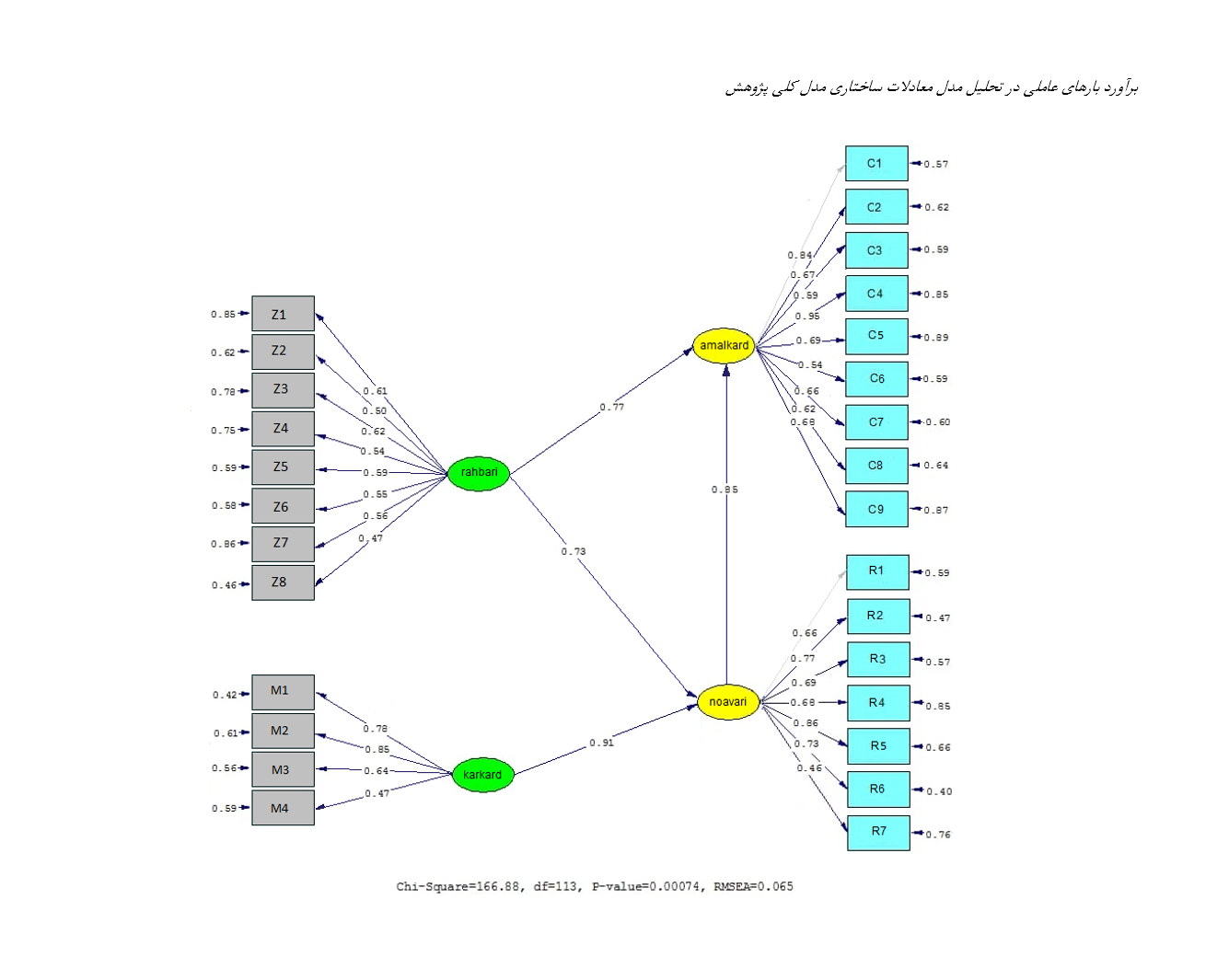گذار زنجیره تامین دارو به سمت پایداری هوشمند با توجه به اثر رویههای زنجیره تامین دایرهای در صنعت 4.0 و رهبری تحولآفرین
چکیده
کاهش منابع، مدیریت کسب و کارها را برای گذار به سمت مدلهای مبتنی بر پایداری هوشمند تحت فشار قرار داده و صنعت تولید دارو نیز از این موضوع مستثنی نیست. با کمک فناوری و رویههای مدیریت در صنعت 4.0، امکان تحقق نیازهای مشتریان با کمترین هزینه و حداکثر کارایی، ضمن رعایت اصول زیستمحیطی و اجتماعی ممکن میشود. با در نظر گرفتن اهمیت این ملاحظات، مطالعه حاضر چند یافته مهم را ارائه میدهد. اول آنکه، رویههای اقتصاد دایرهای روی نوآوری فناوری در صنعت 4.0 اثرگذار است. فناوریهای صنعت 4.0 کارآمدی رویههای اقتصاد دایرهای را افزایش میدهند. دوم آنکه، نوآوری فناوری مذکور، به طور مثبت با عملکرد زنجیره تامین از منظر پایداری مرتبط میباشد. در نهایت، با تکیه بر سبک رهبری تحولآفرین و تسهیل فرآیندها میتوان برای تدوین یک نقشه راه برای گذار به سمت پایداری و خلق ارزش پایدار آماده شد. از این رو، مطالعه کنونی درک عمیقتری در مورد مفاهیم اقتصاد دایرهای و فناوریهای صنعت 4.0 ارائه میکند و بینشهایی را درباره راههای ارتقای عملکرد پایدار در عصر دیجیتالیسازی کنونی ارائه میدهد. جامعه آماری پژوهش حاضر را کارشناسان شرکتهای دارویی مختلف مانند شرکتهای خریدار (اکسیر، البرز دارو، کاسپین تامین و...)، تولید کننده مواد اولیه (شرکت سینا شیشه) و شرکت دارو شیشه که با زنجیره تامین بالادستی و پایین دستی در ارتباط هستند تشکیل میدهند و همین امر، به جامعیت مطالعه حاضر اضافه میکند.
مراجع
Abu-Bakar, H., Charnley, F., Hopkinson, P., & Khedmati Morasae, E. (2024). Towards a typological framework for circular economy roadmaps: A comprehensive analysis of global adoption strategies. Journal of Cleaner Production, 140066, https://doi.org/10.1016/j.jclepro.2023.140066.
Allahviranloo, T., Hosseinzadeh Lotfi, F., Moghaddas, Z., & Vaez-Ghasemi, M. (2024). Decision Making in Healthcare Systems. Publisher of Springer Cham, eBook ISBN 978-3-031-46735-6, https://doi.org/10.1007/978-3-031-46735-6.
Asadi, S.,Pourhashemi, S.O. , Nilashi, M., Abdullah, R., Samad, S., Yadegaridehkordi, E., Aljojo, N., & Razali, N.S. (2020). Investigating influence of green innovation on sustainability performance: A case on Malaysian hotel industry. Journal of Cleaner Production, 258, 120860, https://doi.org/10.1016/j.jclepro.2020.120860.
Belkhir, L., & Elmeligi, A. (2019). Carbon footprint of the global pharmaceutical industry and relative impact of its major players. Journal of Cleaner Production, 214, 185-194, https://doi.org/10.1016/j.jclepro.2018.11.204.
Chauhan, C., Parida, V., & Dhir, A. (2022). Linking circular economy and digitalization technologies: A systematic literature review of past achievements and future promises. Technological Forecasting and Social Change, 177, 121508, https://doi.org/10.1016/j.techfore.2022.121508.
Chen, P., & Dagestani, A.A. (2023). What lies about circular economy practices and performance? Fresh insights from China. Journal of Cleaner Production, 416, 137893, https://doi.org/10.1016/j.jclepro.2023.137893.
Ching, N.T., Ghobakhloo, M., Iranmanesh, M., Maroufkhani, P., Asadi, S. (2022). Industry 4.0 applications for sustainable manufacturing: a systematic literature review and a roadmap to sustainable development. Journal of Cleaner Production, 334(2):130133, https://doi.org/10.1016/j.jclepro.2021.130133.
Dervishaj, A., & Gudmundsson, K. (2024). From LCA to circular design: A comparative study of digital tools for the built environment. Resources, Conservation and Recycling, 200, 107291, h https://doi.org/10.1016/j.resconrec.2023.107291.
Ghobakhloo, M. (2020). Industry 4.0, digitization, and opportunities for sustainability. Journal of Cleaner Production, 252, 119869, https://doi.org/10.1016/j.jclepro.2019.119869.
Govindan, K. (2023). How digitalization transforms the traditional circular economy to a smart circular economy for achieving SDGs and net zero. Transportation Research Part E, 177, 103147, https://doi.org/10.1016/j.tre.2023.103147.
Habibi, A., Kolahi, B. (1401). Structural equation modeling and factor analysis. Tehran: University Jihad, second edition.
Hanif, S., Ahmed, A., & Younas, N. (2023). Examining the impact of Environmental Management Accounting practices and Green Transformational Leadership on Corporate Environmental Performance: The mediating role of Green Process Innovation. Journal of Cleaner Production, 414, 137584, https://doi.org/10.1016/j.jclepro.2023.137584.
He, B., Cai, H., Ji, Y. & Zhu, S. (2023). Supply Chain Green Manufacturing and Green Marketing Strategies under Network Externality. Sustainability, 15, 13732. https://doi.org/10.3390/su151813732.
Jantian, N., Zandiyeh, M., Alam Tabriz, A., & Rabia, M. (2018). Presenting the optimization model of sustainable drug distribution network and using multi-objective evolutionary algorithms to solve it (case of: Daropakhsh Distribution Company). Production and Operations Management, 10(1 (18)), 133-153.
Johnson&Johnson (2023). Delivering more sustainable products and solutions. https://www.jnj.com/environmental-sustainability/products-and-solutions, Last Retrieved by 27.01.2024.
Karmaker, C.L., Aziz, R.A., Ahmed, T., Misbauddin, S.M., & Moktadir, A. (2023). Impact of industry 4.0 technologies on sustainable supply chain performance: The mediating role of green supply chain management practices and circular economy. Journal of Cleaner Production, 419, 138249, https://doi.org/10.1016/j.jclepro.2023.138249.
Kayani, M., Ardakani Andalib, D., Zare Ahmadabadi, H., Mirfakhredini, S.H. (1402). An analysis of the enablers effective on the implementation of the circular economy and Industry 4.0 in the supply chain. Industrial Management Studies, 21(70), 10.22054/jims.2023.71900.2835.
Khan, M. T., Idrees, M. D., Rauf, M., Sami, A., Ansari, A., & Jamil, A. (2022). Green supply chain management practices’ impact on operational performance with the mediation of technological innovation. Sustainability, 14, 3362. https://doi.org/10.3390/su14063362.
Kitsis, A.M., & Chen, I.J. (2021). Do stakeholder pressures influence green supply chain Practices? Exploring the mediating role of top management commitment. Journal of Cleaner Production, 36, 128258, https://doi.org/10.1016/j.jclepro.2021.128258.
Kumar, A., Choudhary, S., Garza-Reyes, J.A., Kumar, V., Rehman Khan, S.A., & Mishra, N. (2023). Analysis of critical success factors for implementing Industry 4.0 integrated circular supply chain – moving towards sustainable operations. Production Planning & Control, 34:10, 984-998, https://doi.org/10.1080/09537287.2021.1980905.
Kusi, M., Zhao, F. , & Sukamani, D. (2021), Impact of perceived organizational support and green transformational leadership on sustainable organizational performance: a SEM approach, Business Process Management Journal, 27 (5), 1373-1390, https://doi.org/10.1108/BPMJ-09-2020-0419.
Lieder, M., & Rashid, A. (2016). Towards circular economy implementation: a comprehensive review in context of manufacturing industry. Journal of Cleaner Production, 115, 36–51, https://doi.org/10.1016/j.jclepro.2015.12.042.
Mondal, S., Singh, S., & Gupta, H. (2023). Green entrepreneurship and digitalization enabling the circular economy through sustainable waste management - An exploratory study of emerging economy. Journal of Cleaner Production, 422, 138433, https://doi.org/10.1016/j.jclepro.2023.138433.
Müller, S.D., Konzag, H., Nielsen. J.A., Sandholt, H.B. (2024). Digital transformation leadership competencies: A contingency approach. International Journal of Information Management, 75, 102734, https://doi.org/10.1016/j.ijinfomgt.2023.102734.
Neligan, A., Baumgartner, R.J., Geissdoerfer, M., & Schöggl, J.P. (2022). Circular disruption: Digitalisation as a driver of circular economy business models. Business Strategy and the Environment, 32(3), https://doi.org/10.1002/bse.3100.
Pwc (2023). The Extended Producer Responsibility (EPR) in Europe. https://www.pwc.ch/en/insights/sustainability/the-extended-producer-responsibility.html, Last Retrieved by 25.01.2024.
Rehman Khan, S.A., Umar, M., Asadov. A., Tanveer, M., & Yu, Z. (2022). Technological Revolution and Circular Economy Practices: A Mechanism of Green Economy. Sustainability, 14(8), 4524; https://doi.org/10.3390/su14084524.
Said, Z., Sharma, P., Thi Bich Nhuong, Q., Bora, B.J., Lichtfouse, E., Khalid, H.M., Luque, R.G., Phuong Nguyen, X., & Tuan Hoang, A. (2011). Intelligent approaches for sustainable management and valorisation of food waste. Bioresource Technology, 377, https://doi.org/10.1016/j.biortech.2023.128952
Sapkota, B., & Pariatamby, A. (2023). Pharmaceutical waste management system – Are the current techniques sustainable, eco-friendly and circular? A review. Waste Management, 168, 83-97, https://doi.org/10.1016/j.wasman.2023.05.052.
Sazvar, Z., Zokaee, M., Tavakkoli-Moghaddam, R., Al-sadat Salari, S., & Nayeri , S. (2022), Designing a sustainable closed-loop pharmaceutical supply chain in a competitive market considering demand uncertainty, manufacturer’s brand and waste management. Business Analytics and Operations Research, 315, 2057–2088, https://doi.org/10.1007/s10479-021-03961-0.
Schiuma, G., Schettini, E., Santarsiero, F. and Carlucci, D. (2022), The transformative leadership compass: six competencies for digital transformation entrepreneurship, International Journal of Entrepreneurial Behavior & Research, 28(5), 1273-1291, https://doi.org/10.1108/IJEBR-01-2021-0087.
Schroeder, P., Anggraeni, K., & Weber, U. (2018). The Relevance of Circular Economy Practices to the Sustainable Development Goals. Journal of Industrial Ecology, 23(1), 77-95, https://doi.org/10.1111/jiec.12732.
Sepahi, T., Shahbazi, M., & Shafiei Roudpashti, M. (2019). Drug distribution system in Iran: a multi-method study of harms and solutions. Health Image Scientific Research Quarterly, (4) 11, 324-343, doi: 10.34172/doh.2020.41.
Silva, A.C., Marques, C.M., & de Sousa, J.P. (2023). A simulation approach for the design of more sustainable and resilient supply chains in the pharmaceutical industry. Sustainability, 15(9), https://doi.org/10.3390/su15097254.
Silvestre, B.S., Tîrca, D.M. (2019). Innovations for sustainable development: moving toward a sustainable future. Journal of Cleaner Production 208:325-332, https://doi.org/10.1016/j.jclepro.2018.09.244.
Suhandi, V., Chen, P.S. (2023). Closed-loop supply chain inventory model in the pharmaceutical industry toward a circular economy. Journal of Cleaner Production, 383, 135474, https://doi.org/10.1016/j.jclepro.2022.135474.
Tahmasabi, H. A., & Hami, M. (2018). Analyzing the resilience and sustainability criteria of the supply chain in the pharmaceutical industry using the interpretive structural analysis method. Scientific Research Quarterly of Standard and Quality Management, 9(34).
Zhang, A., Wangb, J.X., Farooquec, M., Wangd, Y., & Cho, T.M. (2021). Multi-dimensional circular supply chain management: A comparative review of the state-of-the-art practices and research. Transportation Research Part E 155, 102509, https://doi.org/10.1016/j.tre.2021.102509.

دانلود
چاپ شده
ارسال
بازنگری
پذیرش
شماره
نوع مقاله
مجوز
حق نشر 2025 علم تصمیم گیری و سیستم های هوشمند

این پروژه تحت مجوز بین المللی Creative Commons Attribution-NonCommercial 4.0 می باشد.






